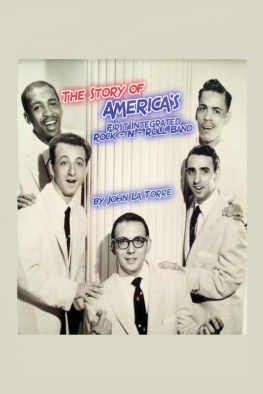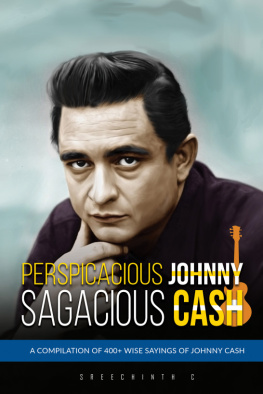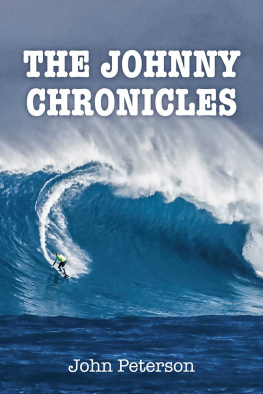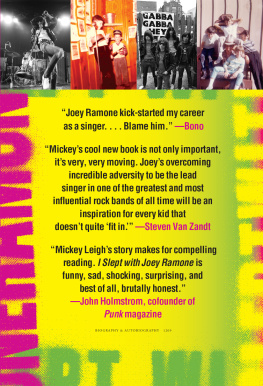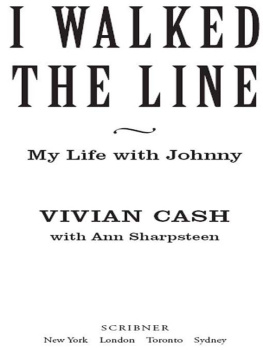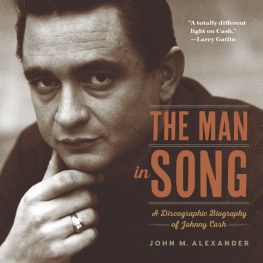

For Abrams:
Designer: Jacob Covey
Production Manager: Jacquie Poirier
Managing Editor: David Blatty
Ramone, Johnny, 19482004.
Commando: the autobiography of Johnny Ramone / by Johnny Ramone.
p. cm.
Includes bibliographical references and index.
ISBN 978-0-8109-9660-1 (alk. paper)
1. Ramone, Johnny, 19482004. 2. Punk rock musiciansUnited StatesBiography. 3. Ramones (Musical group) I. Title. ML419.R324A3 2011 782.42166092dc22
[B]
2010032482
Text copyright 2012 Johnny Ramone Army LLC
Johnny Ramone Army logo by Shepard Fairey, JRA LLC.
All rights reserved.
Today Your Love, Tomorrow the World written by Dee Dee Ramone, Johnny Ramone, Joey Ramone and Tommy Ramone, 1976 (renewed), WB Music Corp. (ASCAP), Taco Tunes (ASCAP) and Evergreen Entertainment Group Inc (ASCAP). Lyrics reprinted by permission.
Wart Hog written by Dee Dee Ramone and Johnny Ramone 1984 Taco Tunes (ASCAP). Lyrics reprinted by permission.
: Photo by Danny Fields. Under exclusive license to JRA LLC. All rights reserved.
photograph by Danny Fields. Under exclusive license to JRA LLC. All rights reserved.
photograph by Deborah Feingold. Under license to JRA, LLC. All rights reserved.
Published in 2012 by Abrams Image, an imprint of ABRAMS. All rights reserved. No portion of this book may be reproduced, stored in a retrieval system, or transmitted in any form or by any means, mechanical, electronic, photocopying, or otherwise, without written permission from the publisher.
Abrams Image books are available at special discounts when purchased in quantity for premiums and promotions as well as fundraising or educational use. Special editions can also be created to specification. For details, contact specialmarkets@abramsbooks.com or the address below.

115 West 18th Street
New York, NY 10011
www.abramsbooks.com
www.johnnyramone.com

FOREWORD
ITS GREAT TO READ JOHNNY RAMONES STORY IN HIS OWN WORDS. Its like having a personal audience with him. It has his pacing, his timing, his rhythm. Its a nice fast readjust the way he would have wanted it.
I always liked Johnny. He was smart and entertaining and fun to be with. I first met him in the high school cafeteria at a table where he was holding court. He was the center of attentionsomething he had to be. A friend introduced us, and that was it. For the rest of the year I would sit at his table. What I really liked about Johnny was his sense of humor. He was sharp as a tack and loved to outsmart you. In fact, he loved to outdo you in any endeavorhe was the most competitive person I ever met.
In those early years, what bonded us was music. The Beatles had just hit our shores a few months before, and there was a mad passion for all the pop bands that were sprouting up. Soon we had our own band, called the Tangerine Puppets. Johnny was an amazing showman in that band. He would hold his guitar high like he was carrying a machine gun and move ferociously on the stage like he was possessed, flinging himself wildly around and undulating with the rhythm. He was the essence of rock and roll.
Johnny was meant to be a musical warrior. Joey, Dee Dee, and I gravitated to him because he was so charismatic and interesting. He was the magnet that pulled us together. In this book, Johnny talks about the hard road traveled through his personal and musical life. It is an insightful and interesting story indeed.
Tommy Ramone
Johnny and Tommy (complete with tube of model airplane glue). Ramones in-store signing at Licorice Pizza, August 26, 1976, Los Angeles. Photo by Jenny Lens. JRA LLC. All rights reserved.

The Tangerine Puppets, 1966. (From left to right) Tommy Ramone (then Tommy Erdelyi), Richard Adler, Bob Rowland, Scott Roberts, and Johnny Ramone (then John Cummings). From the private collection of Richard Adler and Bob Rowland. Used with permission.
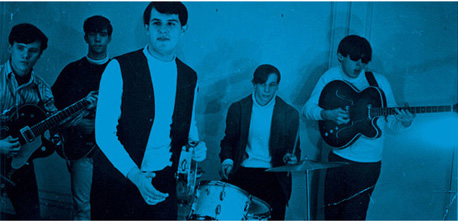
Johnny in Aquarius Records, San Francisco, August, 1976. Photo by Jenny Lens. JRA LLC. All rights reserved.

Prologue
It was that power of the guitar: I walked out there knowing that we were the best. There was nobody even close. Volume was my friend and I never wore earplugs. That would have been cheating.
After retirement came induction into the Rock and Roll Hall of Fame, victory in readers polls that surveyed influential bands, and even me getting ranked as the sixteenth top guitar player in history by Rolling Stone.
But for all the success, I carried around fury and intensity during my career. I had an image, and that image was anger. I was the one who was scowling, downcast, and I tried to make sure I looked like that when I was getting my picture taken. The Ramones were what I was, and so I was that person so many people saw on that stage.
That was both the real me and the image me who beat up Malcolm McLaren in the tiny backstage area at the Whisky a Go Go in Los Angeles in 1978. The place is a great club on the west end of Sunset Boulevard that holds about three hundred people. It has a history of great music, from the Doors to the Stooges to the New York Dolls.
McLaren was talking to my girlfriend, and all of a sudden I decided I didnt want her talking to him anymore, so I told her to come over to where I was standing a few feet away. I heard McLaren ask her, Whats his problem? So I went over to him and said, Whats my problem? and I punched him in the head. He went down but I wasnt done. I went over and grabbed Dee Dees bass to finish the job, but people intervened and hustled McLaren out of there.
The rage started with adolescence and never fully left. I would walk off the stage with that anger going, although it eased when I retired in 1996. While retirement seemed to soften me, the prostate cancer I was diagnosed with in 1997 did so even more. It changed me, and I dont know that I like how. It has softened me up, and I like the old me better. I dont even have the energy to be angry. It has sapped my confidence. I fought it as hard as I could. I figured it would win in the end, but I hate losing. Always did. I liked being angry. It energized me and made me feel strong.
When I was younger, I was ready to go off at any time. My wife, Linda, and I would go out to the Limelight in New York, and I would see people and be able to freeze them with a look. People were even too scared of me to tell me that people were scared of me. I could tell that some people were just uncomfortable around me. I never tried to make that happen; it just did.


